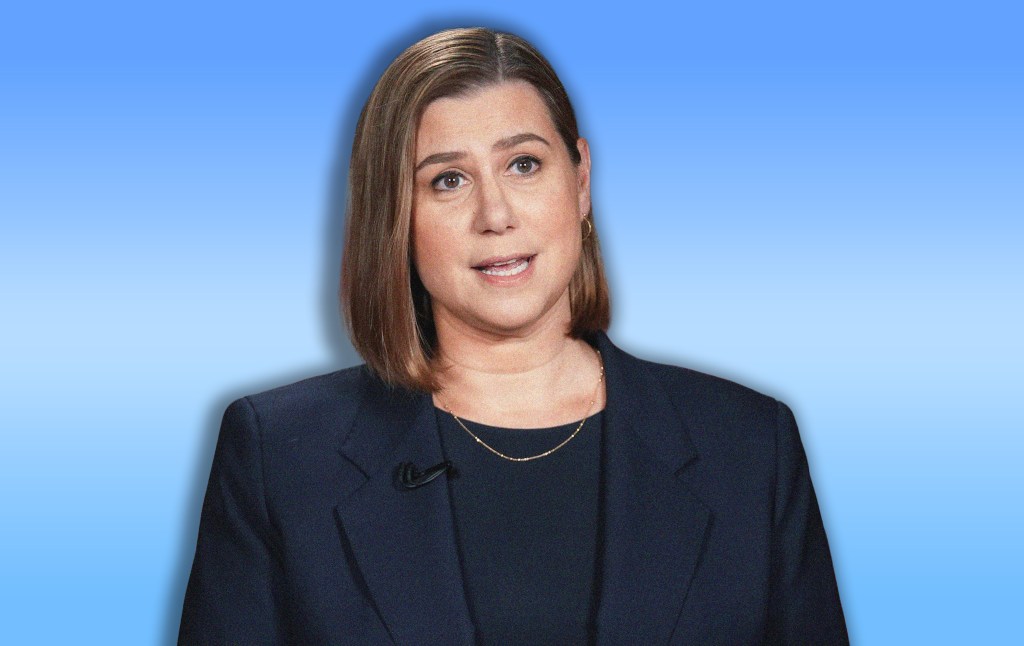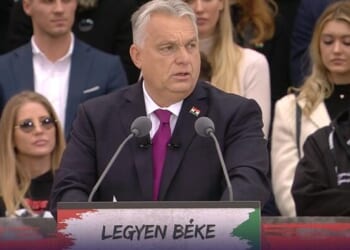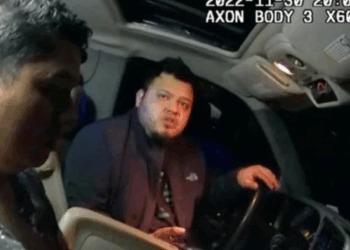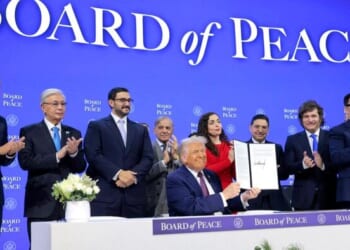
OVERLAND PARK, Kansas—Sen. Elissa Slotkin is angry and impatient, in a civil but firm Midwestern sort of way.
The Michigan Democrat is angry at what she perceives as her party’s institutional failure to reckon with Donald Trump’s unique threat to the American constitutional order, and the resulting feckless attempts to check the Republican president’s second-term executive overreach. Slotkin also is impatient—with old-guard Democratic leaders who, the 49-year-old freshman senator believes, allowed the party to atrophy in the Midwest and aren’t proactively offering voters a clear alternative to Trump that addresses their concerns.
“The old way of doing business does not work. The old way of running these institutions does not work for the moment we find ourselves in, and we are not meeting the moment,” Slotkin said Wednesday evening, during a town-hall-style event in suburban Kansas City organized by VoteVets, a Democratic-aligned group that backs candidates with military backgrounds. “Democrats, if we are going to deal with the onslaught from the White House, need to A) have a plan and B) get a little more alpha energy.”
“In order to protect the country that we love, in order to keep the values that we hold so dear, we cannot just play defense. We must go on offense. We have to have our own plans, our own ideas—our own project 2029,” she added.
That term, “project 2029” is a direct reference to Project 2025, the governing roadmap for Trump’s second administration the president’s allies at the Heritage Foundation developed during his four years out of office. Slotkin’s rhetorical sleight of hand wasn’t a one-off. More than once, the senator detailed proposals she would include in “my project 2029.” (No. 1: “Declare a housing emergency” to address voters’ affordability anxiety, the senator said, to the delight of an Overland Park Convention Center crowd of roughly 450 veterans and their family members.)
Of course, a U.S. senator using such precise language while traveling the country, calling out her party’s past and current shortcomings, criticizing current leadership, and pitching a fresh approach is bound to raise questions about her endgame. That’s especially the case when the incumbent Republican president is term-limited and the Democratic Party is casting about for who, and what, comes next, suggesting the 2028 primary is poised to be a free-for-all. So, is Slotkin interested in participating? She didn’t say “no.”
“I’m trying to take the bull by the horns and say: ‘If others aren’t going to come to the middle of the country; if others aren’t going to put ideas out there, I’m going to,’” Slotkin told The Dispatch during a brief interview following the town hall before she hurried to headline a fundraiser for the Kansas Democratic Party. “Maybe it’s spitting in the wind. But I’m going to put out affirmative ideas because I don’t see enough people doing that in the party.” Those ideas, on domestic and foreign policy issues, and what the Democratic Party has to do to become more competitive, have been aired in a series of speeches and appearances across the Midwest and at conferences in Washington, D.C.
“I don’t know what I’m waiting for,” she added. “I’m certainly not interested in waiting 20 years until I get high enough in a committee that I might be able to ask a question in the first 30 minutes of hearing. That’s not my goal. But I have no grand plan.” Maybe not, but earlier Wednesday she hosted a roundtable with Kansas military veterans on the VoteVets’ mailing list to hear more about their priorities, the sort of time investment that suggests some plan is afoot.
Whether Slotkin has a 2028 plan or not, her call for fresh Democratic fighters to take the reins of the party struck a chord. Such comments, which the senator delivered repeatedly in some form or another throughout the two-hour town hall, were a particular crowd pleaser. “She’s ready for her generation to move forward—that message came through loud and clear—and I can’t disagree with her,” said Sharon Yeado, a middle-aged Democratic voter from nearby Leawood, Kansas.
Slotkin’s speciality is national security.
Her résumé is a veritable alphabet soup of government experience—in Washington, D.C., and overseas. She was an analyst for the CIA, served in the Office of the Director of National Intelligence and on the National Security Council, and held policy posts at the Defense Department. But the economy was the theme of Wednesday’s town hall in eastern Kansas, and the senator obliged, although she did get desperate questions about Trump’s deployment of National Guard and uniformed military to American cities.
“What are we going to do about it?” George Hanna, chairman of the Kansas Democratic Party’s Veterans and Military Families Caucus, asked Slotkin.
“There is nothing more contrary to American values than to have uniformed military, who are trained—everyone here trained to go after foreign adversaries—to then turn their gaze towards their own fellow citizens and [set] the dynamic where the citizens are the enemy,” she responded. “I think that is deeply dangerous for democracy.” With Republicans in the GOP-controlled Congress disinclined to oppose Trump’s domestic military deployments, Slotkin pointed to legislation she has proposed to foster more debate on the issue.
Primarily, however, the audience was concerned about the economy, peppering Slotkin with questions about the high cost of health care, housing, and just about everything else they spend money on other than the price they’re paying for gas.
The senator’s pragmatic answers, ambitiously liberal enough for partisan Democrats but tempered enough for swing voters and recent, former Republicans, reflected the political tightrope she’s had to walk in Michigan, a battleground state that has switched parties in three consecutive presidential elections while narrowly maintaining a streak of choosing Democratic senators that dates to 1996. For instance, Slotkin proposes reforming the Affordable Care Act (aka Obamacare) by adding an option to purchase portable insurance directly from the federal government.
But when a skeptic in the audience who advocated for government-run health care asked Slotkin how her proposal would make insurance affordable, the senator said flatly that “Medicare for all” isn’t politically feasible. “I do believe in universal health care. Every American deserves access to care they can afford,” Slotkin said. “I’m just not prepared to say that every American has to be on that plan. … I’ve got to leave that choice in there because as you may have noticed, we have a pretty diverse country that feels differently about this issue.”
Slotkin was first elected to Congress in 2018, flipping a Republican-held seat in the House of Representatives, partly by marketing herself as a moderate who proudly served in the administrations of Presidents George W. Bush and Barack Obama. That messaging grates on Republicans, who argue Slotkin talks moderation but votes as a boilerplate liberal on Capitol Hill. Indeed, her lifetime legislative House voting score with the conservative activist group Club for Growth is 4 percent. And per ABC News, she voted 88.9 percent with President Joe Biden in 2023.
Slotkin’s political positioning nonetheless continues to work.
In 2024, she was elected to the Senate 48.6 percent to 48.3 percent even as Trump defeated then-Vice President Kamala Harris in Michigan 49.7 percent to 48.3 percent. The senator did that by outrunning Harris in 68 of Michigan’s 83 counties, the Detroit News reported, including suburban Detroit’s Oakland County and urban Detroit’s Wayne County. If this experience and advancing to statewide office suggest Slotkin would join Democratic moderates in the Senate and compromise with Republicans to end the recently concluded longest government shutdown in history, think again.
Slotkin voted against ending the shutdown earlier this week when a group of fellow Senate Democrats broke ranks and cut a deal with Republicans to reopen the government. And she wasn’t shy about telling the town hall audience here what she thought about the deal, which—among some guaranteed items—amounted to the GOP promising a Senate floor vote to extend expiring Obamacare subsidies versus the firm extension congressional Democrats had been demanding in exchange for their votes to halt their filibuster.
First, she attacked the Republicans. “They do not give a crap about the cost of health care; they will take the money from health care and put it into tax breaks for the wealthiest Americans. That was laid bare,” Slotkin said, before turning her fire on fellow Democrats.
“But the other thing that was laid bare—you watched it, I don’t think we have to hide it—there were disagreements among Democrats on how to end the shutdown. There was a debate,” the senator said. “I voted no on reopening the government because I didn’t get anything on health care, not a single thing. A promise of a vote is not enough.” (Notably, the audience erupted in applause, cheering Slotkin perhaps louder than at any subsequent moment of the town hall.)
During her interview with The Dispatch afterward, Slotkin offered additional complaints about her party and its leadership in the Senate when asked to elaborate on her negative assessment of the bipartisan agreement that ended the shutdown. Democrats, she said, need a “coordinated, thoughtful, gamed-out plan; they need to be unified, “which is not something Democrats are great at” and they need to communicate effectively, “which is not something we’re always the best at.”
She blames Senate Minority Leader Charles Schumer of New York, who was first elected in 1998 and turns 75 this month, at least in part.
“The Senate has changed a lot. I’ve been there 10 months and I think the entire game board is different because of Trump, and I think that that is hard for him and lots of others who have been there a really long time to understand—that the Senate of 2004 is not the Senate of 2025,” Slotkin said. “I’m looking for fellow leaders who want to actually tag-team and do something. And, I’m just not interested in another strongly worded letter; I’m just not.”

















